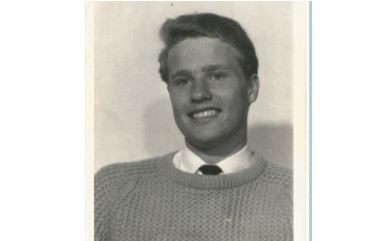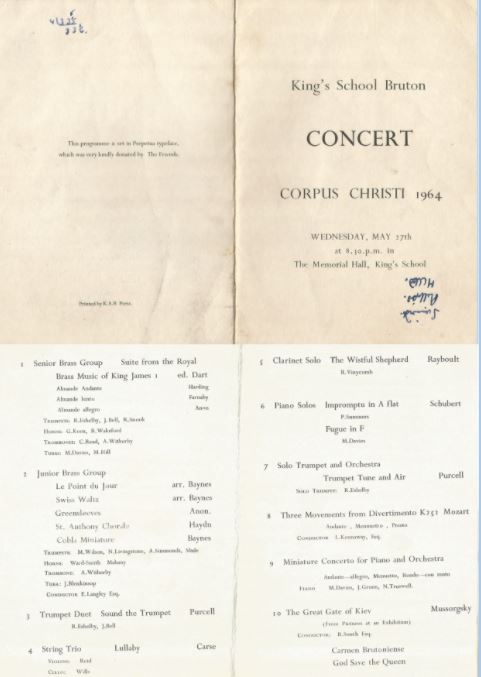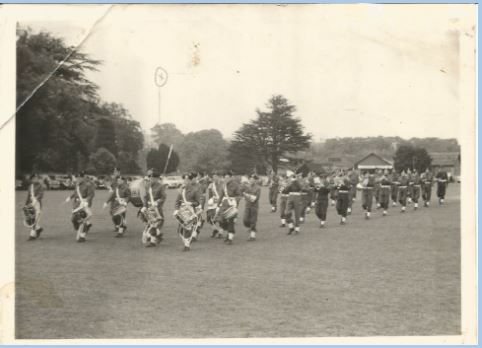Music at Bruton - A Ray of Sunshine
The Music School was the place I felt most at home in my five years at Bruton (1960-1965).

The head of department was Robert South, an accomplished pianist, well known on the BBC as a soloist and duettist with Mrs. South. He was a warm and kindly person, softly spoken and generous with his time. Music of all sorts flourished under Mr. South.
If you wanted concerts, everyone had to go to the School Concert each term, but there was also the Bruton Subscription series, which featured top quality musicians several times each term. I well remember Leon Goossens, the celebrated oboist explaining his come-back to performance following a serious facial injury in a car crash. He played beautifully despite it.
The very active Music Society and Jazz Society allowed us to visit Bristol’s Colston Hall to see such fabled musicians as Ella Fitzgerald and Oscar Peterson in person. (It also gave us the opportunity to buy fish and chips, or, more likely, to visit a pub after the concert and before the coach left for school.)

My first taste of opera was at Bruton.
‘Opera for All,’ a well-known group which presented opera in full costume, sung to a piano score, made me want to be an opera singer. I remember seeing
‘La Bohème‘ and
‘Cosi Fan Tutte’ being enthralled at the beauty and power of the human voice and the poignancy of the drama in opera. It was on 22nd November 1963 (St. Cecilia’s Day), at a performance of the
‘Western Ballet Theatre’ that a murmur ran around the Sunny Hill hall that President Kennedy had been assassinated
I sang in the Church Choir for five years, as soprano, alto and tenor, joined the Madrigal Group, conducted by Pam Wiles, wife of The Priory Housemaster, and then the combined choir with Sunny Hill. It was an amazing experience to pour out the tenor line in four-part harmony of Mozart’s
‘Requiem’ or
‘The Christmas Oratorio’ . We were all quite used to belting out the School Song,
‘Floreat Brutonia’, in full voice, marching arm in arm past Plox, following a sports victory, but singing oratorio was something else!
The most important person at Bruton, for me, was Ernest Langley, the brass teacher. He was short in stature, with a pencil moustache and had been a horn player in the Welsh Guards. He was a peripatetic teacher, who taught at most of the local public schools. He still played regularly in the orchestral pits in Bristol. Mr. Langley was an inspiration to me. He was a good teacher. I liked him for his generosity of spirit and down-to-earth approach to music. Friday was his teaching day and the best day of the week. I remember as a bewildered and unhappy Third Former, watching Mr. Langley conduct a brass quartet, on stage, in the Hall. When the music stopped, he turned round to his captive audience and offered us the chance to play a brass instrument. I jumped at it. I had already picked up a bugle, in the band room next to the railway line. (It was next to the room where we kept our C.C.F. uniforms and which always smelled of fragrant wood smoke. Maybe it had been a smoke-room at some point.) I loved playing the bugle, which I and others practiced daily during break, and I soon became one of the buglers who announced
‘Fall In’ at the start of parades and the
‘Last Post’ and
‘Reveille’ on Armistice Day.

I took up the trumpet, formally, when I was in the Fourth Form, taught by Mr. Langley. Within a year I had passed Grade V and took Grade VI in the Lower Sixth Form. I became a Sergeant in the Cadet Band, a group maybe of twenty-five boys, if you include side drums, bass and tenor drums and bugles. Keith Warren-Price was splendid as our Drum Major. In those days, there was a lot of throwing of the mace aloft. I don’t remember Keith ever dropping it! The band played for Armistice Services, both inside and outside church and paraded on special occasions throughout the year. A small group of us, including Chris Read, Martin Davies and Marcus Hill, played and sang throughout our time at Bruton. I still have some of our concert programmes, which I have recently unearthed.
I should mention, at this point, the influence of David Hindley, who came to teach at Bruton when I was in the Fifth Form. David had been a choral scholar at (I think) Selwyn College Cambridge, and soon threw himself into the musical life of Bruton.
Did all this music influence my later life? Of course it did! I was determined to become a singer and sang professionally, as a tenor, for five years with Queensland Opera and with the D’Oyly Carte Opera, touring Britain and Australia, performing eight shows a week for forty-eight weeks a year. When I gave up the stage, I became a social worker and care home proprietor, caring for elderly people with dementia, but sang as an amateur until I was nearly seventy. For more than ten years, my wife Ruth and I ran and sang with Dorset Chamber Opera, putting on operas in country houses and theatres. I took up the trumpet and cornet again at nearly sixty years of age and, having practiced dutifully nearly every day, I have become a useful brass band and military band player. I have been Chair of Christchurch and Highcliffe Brass Band for six years.

There is so much pleasure in making music and joining in harmony with others. The experience lasts a lifetime.
Thank you, Robert South. Thank you, Ernest Langley. Thank you, David Hindley. Thank you, King’s School Bruton for giving me the joy of a life-time of music!
I've been rummaging in my trunk and found a few concert programmes from the early sixties. I'd completely forgotten the
Paul Tortellier Cello Concert, and the
La Traviata had also escaped my memory.
I was really pleased to find the photo of the CCF band, which, from the personnel I can recognise, dates to summer 1961 or 1962. Looking at the photograph, I can still remember many of the names. My twin, Jim, is in the front row, second from the right, playing the side-drum. I'm somewhere in the back with the bugles. I seriously underestimated the numbers in the band, with drums and bugles they seem to number nearly 50 players.


